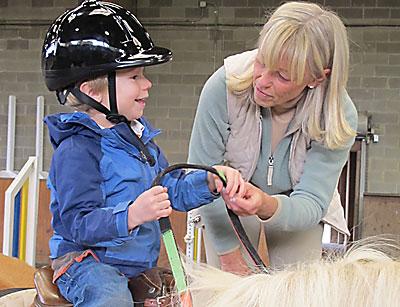Equine Teachers Help Kids Overcome Obstacles

A triumvirate of teachers live in Sagaponack, and spend their time tirelessly helping children with special needs — whether physical or learning-related — by providing therapy that helps build not only muscles but self-confidence. And they do it all without saying a word.
The trio — Mosely, Cookie, and Kirolak — are horses that have been specially trained to assist children with special needs, and the program they are part of, the Center for Therapeutic Riding of the East End, or CTREE, sees approximately two dozen kids come every week for a chance to ride, groom, and hug the horses.
“The relationship that the kids develop with the horses is a partnership,” Karen Bocksel, the managing director of CTREE, said last week. CTREE is held at the Wolffer Stables on Narrow Lane East behind the vineyards that stretch north from Montauk Highway.
Ms. Bocksel has an adult son with special needs and it was because of him that she initially became interested in equine therapy.
Ms. Bocksel is a certified PATH instructor — that’s the Professional Association of Therapeutic Horsemanship International — and said her job is her passion.
“My heart’s in there. It’s in the ring with the kids,” she said.
The CTREE program has been growing since it was founded about four years ago. “The horses have been specially trained to tolerate loud noises, sudden movements, tight legs because of cerebral palsy. If a child is cognitive-impaired, they may not hold the reins correctly. The horses understand that it’s okay,” she said. “They’re very gentle.”
Mosely has occasionally had as many as 20 kids surrounding him for a grooming session. “He’s happy to just stand there,” Ms. Bocksel said with a smile.
Have there been noticeable changes in the children due to their experiences at CTREE? “One little boy said his first meaningful word while riding,” Ms. Bocksel recalled. “He said ‘Yellow’ and reached for something yellow, and his father burst into tears.”
One autistic child was overwhelmed by the prospect of riding a horse when he first started. “Now he can stop and steer. It’s really amazing,” Ms. Bocksel said.
Emma Walton Hamilton, an author who lives in Sag Harbor (and the reporter’s stepsister) has noticed huge changes in her 8-year-old daughter, Hope, who was born with cerebral palsy.
“When she started two years ago, she had someone leading the horse, a volunteer on each side of her, and she still needed to hold onto my hand, with white knuckles,” Ms. Hamilton said. “Now she trots independently, does figure eights, all by herself. It’s been so incredibly valuable,” she said.
“Physically it’s straightened her posture,” Ms. Hamilton said. “It’s strengthened her back and her legs. But what is the most important is what it has done for her confidence.”
Ms. Hamilton’s belief in the importance of the CTREE program has led her to a place on its board of directors. “It’s given Hope a sense of community,” she acknowledged. “She doesn’t feel different anymore.”
CTREE recently ran a program in conjunction with the Child Development Center of the Hamptons. “The kids came on Mondays from 12 to 2,” Ms. Bocksel said. “They had a full curriculum on how to take care of a horse, learning to ride, learning about different breeds of horses, everything,” she said.
CTREE also offers private and semi-private lessons in the afternoons. In addition to Ms. Bocksel, there are two certified instructors.
The program is nonprofit, and holds two fund-raisers a year. “Wolffer Stables has been extremely helpful,” she said. “They have given us a break on our board, and free office space,” she said. “My living room is very happy now.”
The program has room to grow, but volunteers are needed. “We cannot exist without volunteers,” she said.
Those who do volunteer do not need to be horse-friendly, at least not at first. They are trained and taken through an orientation. Anyone over 14 is invited to volunteer with CTREE, and community service credits are offered for high school and college students.
The program also offers scholarships. “No one gets turned away,” Ms. Bocksel said. She looked out into the fields. “The atmosphere here is so spectacular,” she said. “It’s somehow restorative for the students.”
